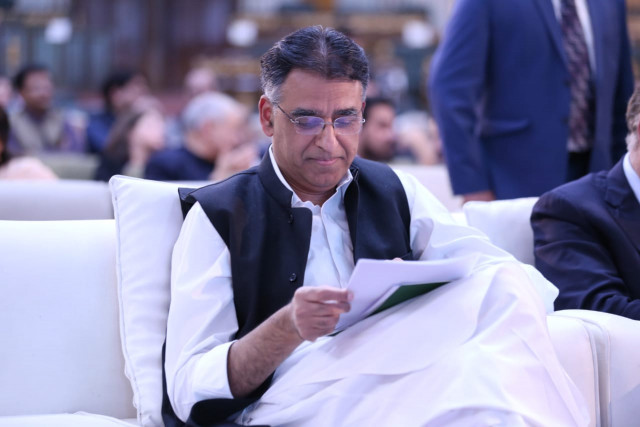Asad Umar’s exit may delay IMF bailout
International lender will consult new economy czar before Pakistan visit

PTI leader Asad Umar. PHOTO: PTI
If the new adviser to the prime minister on finance takes longer than needed to decide calling the IMF mission, it could delay finalisation of the programme as well as the next budget.
Former finance minister Asad Umar had promised to unveil the budget for fiscal year 2019-20 on May 24.
This time, the IMF’s Executive Board would approve Pakistan’s loan request only after the approval of the new tax measures by parliament, even if both the sides reach a staff-level agreement.
Asad Umar sees hard times ahead for successor
“As it is the case with all IMF missions, the timing of the staff’s visit is decided in consultation with the country’s authorities. We will consult with Pakistani authorities on this matter in the upcoming days,” IMF Resident Representative for Pakistan Teresa Daban told The Express Tribune.
She had been requested to comment whether the removal of Umar as the finance minister would affect the upcoming IMF mission’s visit to Pakistan.
On Monday, the IMF had announced to send a mission to Pakistan “before end of April to continue discussions” from where Umar had left during his five-day trip to Washington.
President Dr Arif Alvi on Friday approved the appointment of Dr Abdul Hafeez Shaikh as adviser to the prime minister on finance, revenue and economic affairs, with the status of federal minister, with immediate effect, according to a notification of the Cabinet Division.
Shaikh arrived in Pakistan on the same day from the United Arab Emirates.
He confirmed to The Express Tribune that he on Friday resigned from the management of Rivendell PE LLC – a private equity and capital venture firm. Shaikh would also divest his shares in the firm to avoid the question of conflict of interest.
The other day, Prime Minister Imran Khan suddenly decided to remove Umar from his position after months-long lobbying by Jahangir Khan Tareen.
The prime minister also appointed Shahzad Syed Qasim as special assistant on power and Nadeem Babar as special assistant on petroleum.
Hafeez Sheikh brought in to replace Asad Umar in major cabinet reshuffle
Shaikh has remained in the cabinet of former military dictator General (retd) Pervez Musharraf. He also served as the finance minister from (2010-2013) in the last tenure of the Pakistan Peoples Party.
Sources in the finance ministry said the IMF wanted to make sure that the new economic czar owned the commitments given by Umar.
They said that Shaikh also needed time to reconcile with the ground realities and assess the macroeconomic situation.
Shaikh is expected to build on the IMF programme from where Umar had left in order to save time.
Umar had announced that both the sides documented the agreement and an IMF mission would arrive in Islamabad this month to sort out technical details. The expected size of the IMF loan was estimated at be $7.5 billion to $8 billion by Umar.
Due to the difficult nature of the IMF conditions and its long-term political and economic consequences, it was justifiable for the new adviser to fully assess the implications of the IMF deal before inviting the mission to visit Pakistan.
The conditions that the IMF imposed in return for the bailout appeared stringent that would keep the PTI government on its toes.
The IMF is seeking a steep increase in tax revenues, cut in expenditures to sow a primary balance, flexible exchange rate regime, full disclosure of all types of financial arrangements with China and increase in electricity and gas prices.
All this would require huge political capital and it will be a challenging task for the new finance adviser to fulfil all these conditions and at the same time make sure that inflation does not go up, jobless rate does not increase and economic growth rate remains above 5%.
Umar had managed to get some concession from the IMF on Federal Board of Revenue’s tax-to-GDP ratio and primary balance level, although both these areas were still open for further discussions.
Pakistan’s second last programme with the IMF (2008-2010) ended prematurely on the watch of Shaikh when he could not get Reformed General Sales Tax Bill passed from parliament –a condition of the IMF at that time.
The IMF had not disbursed the remaining $3.2 billion out of a total of $11.4 billion deal.
Due to weak economic management, the IMF in 2011 had recommended in post programme monitoring report that president of Pakistan should sign future pacts to ensure its delivery.
There were also unconfirmed reports that Prime Minister Imran may appoint an economic advisory board to keep a check on the new finance adviser. It will have to been seen whether Shaikh would like to have such an arrangement where a parallel arrangement exists.
Any arrangement where there will be more than one finance minister would further slowdown the process of economic policymaking.



















COMMENTS
Comments are moderated and generally will be posted if they are on-topic and not abusive.
For more information, please see our Comments FAQ